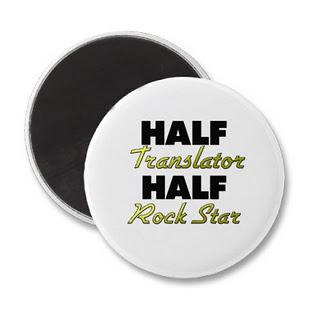Secondo David Bellos, autore di Is That a Fish in Your Ear? Translation and the Meaning of Everything (di cui ho parlato QUI): "It’s true in America, but it’s even truer in Britain, that there is a kind of cloud of disapproval over translators and translations,(...) Reviews (...) of translated books — if they mention the translating at all, it’s to disparage it. Bit by bit over the years, I’ve come to realize that these are very effective devices for holding the foreign at bay. It’s a way of comforting yourself: ‘Oh well, I only read English, and I don’t really have to take these books from elsewhere terribly seriously because they are only translations.’”
 L'articolo continua dicendo che: "(...) Bellos has a good case when he says that translators deserve better. 'A long novel — maybe you get $10,000, in dribs and drabs. A bit on signature, a bit when you deliver the manuscript, a bit when it’s published. How many of those have you got to do in a year to make that a living? More than is really conceivable to do well (...) You would have to translate at 90 miles an hour and not revise. Most literary translators don’t want to do that, even if they could. You can’t really live as a literary or book translator in the English-speaking world as a full-time job and also sleep.”
L'articolo continua dicendo che: "(...) Bellos has a good case when he says that translators deserve better. 'A long novel — maybe you get $10,000, in dribs and drabs. A bit on signature, a bit when you deliver the manuscript, a bit when it’s published. How many of those have you got to do in a year to make that a living? More than is really conceivable to do well (...) You would have to translate at 90 miles an hour and not revise. Most literary translators don’t want to do that, even if they could. You can’t really live as a literary or book translator in the English-speaking world as a full-time job and also sleep.”Interviene anche Lydia Davis (di cui ho parlato in una serie di post, QUI, QUI, QUI e QUI), parlando della sua traduzione di Madame Bovary, e del fatto che non legge mai tutto il libro prima di cominciare a tradurlo (e in questo io e lei ci assomigliamo), perché "she prefers an element of surprise." E: "There’s no drawback to this, because of course you’re going to do another draft and then another draft, so there’s plenty of time to go back over your work and change things in light of what you now know."
Mentre Philip Gabriel, che ha tradotto in inglese 1Q84 insieme a Jay Rubin, lavora in modo diverso: “I usually read the book straight through, then go back and translate a rough draft of about four pages per day until it’s all done, (...) I try to spend some time previewing the next day’s pages so I don’t get too caught up on particular passages.”Non manca naturalmente il paragone fra il lavoro del traduttore e quello del musicista (metafora azzeccata anche se un po' trita) evocato da Tiina Nunnally, traduttrice dal danese e dallo svedese, che scrive: “It requires a talent for transforming words from one language into another, and doing it so that it doesn’t become apparent that the reader is reading a translation. That’s the real trick, because Americans especially have a certain wariness about reading a translated work. I can’t tell you how many people have said: ‘Well, I’d pick it up, but I could see it was a translation so I didn’t really want to read it. I knew it would sound awkward.’ That’s our goal, to make sure that it doesn’t sound awkward.”Imre Goldstein, traduttore dall'ungherese, paragona il libro tradotto a una produzione teatrale: "Potentially the most gratifying and elevating teamwork, a theatrical production, as everyone knows, requires the input of many collaborators. Often, reviewers write only about some, say, the director, the actors and the costume designer, leaving out others, such as the composer, the musicians, the lighting designer, fight choreographer and all the invisible but indispensable tech crew, without whom there would be no production. When, as a translator, I am not mentioned in a review, I console myself by assuming that the reviewer read the text as if it were the original."
E infine, tornando a Bellos, leggiamo che: “Japanese literary translators have much the same status as authors do in Britain and America. Many author-translators are household names, and there’s even a celebrity-gossip book about them: ‘Honyakuka Retsuden 101,’ or ‘The Lives of the Translators 101'. (...) They’re rock stars (...) Maybe it’ll fade away over the next century, maybe it’s just something of a fossil. Or maybe the Japanese have got it right, and we should treat all translators as rock stars. I wouldn’t mind.”
Quest'ultima parte alimenta la mia curiosità sulle traduzioni dal giapponese, di cui sto discutendo e sentendo parlare parecchio in questi giorni. Tornerò presto sull'argomento.
Nel frattempo, trovate l'intero articolo QUI.






